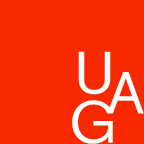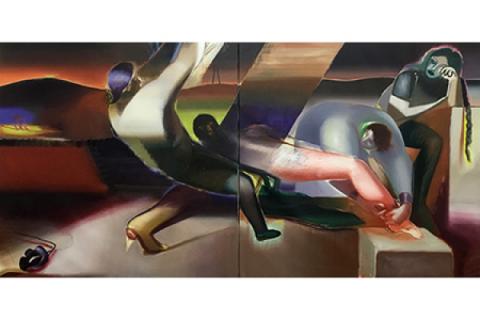Katherina Olschbaur: Dirty Elements
Extended to March 21
Katherina Olschbaur: Dirty Elements
Curated by Allyson Unzicker
Jan. 11 - Mar. 21, 2020
Contemporary Arts Center Gallery
Opening reception: Saturday, Jan. 11, 2-5 p.m.
A series of new paintings by Austrian-born, Los Angeles based artist Katherina Olschbaur. The exhibition explores the violence of power dynamics within patriarchal order. Using the body as site of repressed desire, the works feature erotically charged scenes.
Free admission and open to the public.
Gallery Hours | Tuesday - Saturday | 12:00 – 6:00 p.m.
 University Art Galleries
University Art Galleries
712 Arts Plaza | Irvine, CA 92697 | uag.arts.uci.edu
Gallery Hours | Tuesday - Saturday | 12–6 p.m.
"The law is not patriarchal because it denies the existence, even the power, of women...The law is patriarchal because it denies the bodies, sexualities of women. In patriarchy, there is no menstrual blood."
– Kathy Acker, Reading the Lack of the Body: The Writing of the Marquis de Sade
The University Art Gallery is pleased to present Dirty Elements an exhibition of new paintings by Austrian-born, Los Angeles based artist Katherina Olschbaur. On view in the Contemporary Arts Center Gallery January 11th through March 14th, 2020, the opening reception will be held on Saturday, January 11th from 2:00 pm until 5:00 pm.
Olschbaur provides a female perspective to a history of canonized male painters, whose work simultaneously inspires her. Although traces of matriarchal order in Western thought typically appear as a mythological apparition, Olschbaur paints a narrative that subverts our expectations under the normative language of patriarchy. For Olschbaur, art historical tropes are appropriated and used like garments, worn then cast aside in a process that is ever changing and moving within each work. In this way, Dirty Elements investigates the power dynamics of patriarchal order and its violent denial of female sexuality. Referencing a wide spectrum of thought, Olschbaur’s practice takes root in mythology, religious and historical paintings, the subcultures of S/M, and film. Embracing Georges Bataille’s concept of the formless, the paintings explore the dirty elements of our carnal horizontality. In so doing, they feature provocative and erotically charged scenes that are at times humorous and disturbing.
Olschbaur’s practice involves a process of fervently sketching out these scenes before painting them. Working in a wet-on-wet process, she paints on a malleable surface that is in a constant state of disruption, where scenes formulate out of an amalgam of autobiographical, historical and imaginary narratives. In this layered process, her paintings elicit the expressive freedom to create order that only leads to disorder. By creating angular compositions, tension builds within the narratives by disallowing any singular perspective. This dense and meditative space is reflected by focusing on representations of the body as a site of repressed desire. Placing gender constructs into question, figures are seen bound, trampled or falling into animated plasticity. The backdrops are dark and ominous landscapes formed through a mirage of artificial colors, while the foregrounds are pregnant with smooth glossy bodies that sometimes transpose into animals. Without relying on meaning alone, the works contemplate a space between seduction and malaise, moving beyond the silent surface of the canvas.
Katherina Olschbaur (b.1983, Austria; lives and works in Los Angeles) has been the subject of solo exhibitions at Gnyp Gallery, Berlin (2019), Nicodim Gallery, Los Angeles (2018), OOF Books, Los Angeles (2018), PØST, Los Angeles (2018), Galerie Werkstadt Graz (2016), Museum Spoerri, Austria (2011), MUSA Vienna (2011). Recent group exhibitions include Paul Kasmin Gallery, New York, Nicodim Gallery, Los Angeles and Bucharest, Christine König Galerie Vienna, PG Art Gallery, Istanbul, Museum Gironcoli, Austria, Salzburger Kunstverein, Kunsthalle Krems, and at Symbiosis - XI Biennale de la Mediterranée, Thessaloniki. Awards and residencies include IBK Painting Prize (2018), Red Gate Residency, Beijing (2017), Theodor Körner Prize (2009).

